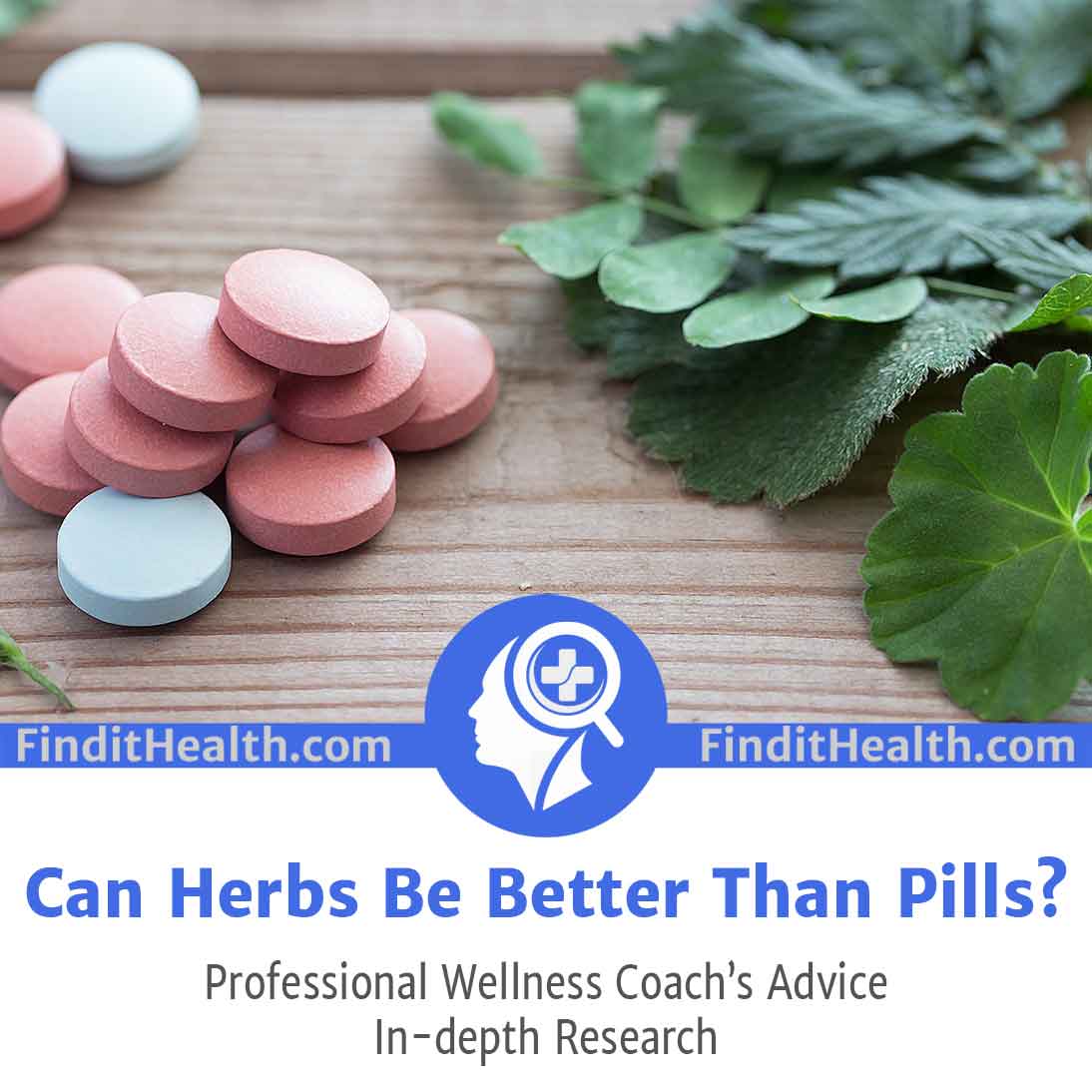
As head of the wellness coach team at Find It Health, I have spent years diving into the details of both traditional and modern approaches to health. Our team has poured over countless studies, ensuring that our guidance is based on solid, research-backed information.
A study published in Evidence-Based Complementary and Alternative Medicine by Shu-Yi Yin et al., 2013 found that certain herbal medicines can provide equivalent, or even superior, therapeutic effects compared to conventional medicines. This does not mean one method completely outshines the other.
Over the next sections, we’ll explore herbal remedies and supplements in-depth, contrasting them against conventional medicine, and provide a clear, well-rounded picture. With this, you’ll understand the beneficial aspects of each approach and be able to make an informed decision for your health.
Herbal Medicine Vs Prescription Drugs
Choosing the right treatment involves understanding the differences between herbal products and pharmaceutical drugs. Each has its unique characteristics, and your choice can significantly influence your overall health. Here are some details:
Form and Active Ingredients
Pharmaceutical drugs, or conventional drugs, generally come in a capsule or liquid form.
They typically contain synthetically derived active ingredients, targeting specific health issues with precision.
In contrast, herbal supplements are sourced from medicinal plants, containing natural active ingredients that may act synergistically for holistic wellness. These also come in various forms, such as teas, tinctures, and capsules.
Regulation and Accessibility
Pharmaceutical drugs are heavily regulated, requiring a healthcare provider’s prescription, which ensures their appropriate use. Herbal products, conversely, are available over-the-counter, offering quick access but raising concerns about quality consistency due to less stringent regulations.
Costs and Health Impact
Pharmaceutical drugs can lead to substantial additional healthcare costs. Insurance coverage varies widely, and out-of-pocket expenses can accumulate. Herbal supplements, on the other hand, are typically more affordable, but insurance often doesn’t cover them.
Effects and Efficacy
Pharmaceutical drugs have well-studied positive effects on conditions like cognitive function, among others, based on rigorous human studies. The efficacy of herbal products can vary, with some showing promising results in studies, though more research is needed to fully understand their impact.
Natural Remedy versus Conventional Approach
Herbal supplements are viewed as a natural remedy, working in harmony with the body’s natural processes. Conventional drugs, however, target specific issues directly, offering fast relief but potentially overlooking the body’s holistic needs.
SUBSCRIBE for FREE STRESS MANAGEMENT TECHNIQUES from our EXPERT COACHES!
Origins Of Herbal Medicine
Long before the advent of conventional medications, our ancestors were utilizing nature’s gifts to treat their ailments. Herbal medicine’s roots sink deep into human history, with the practice passed down through generations and cultures.
Where it All Began
Herbal therapy originated in ancient civilizations worldwide.
They used medicinal herbs to treat a wide variety of medical conditions, from common ailments to complex diseases like cardiovascular diseases.
Herbal Medicine Today
Currently, herbal medicine is marketed primarily as dietary supplements. You can find these in health food stores, pharmacies, and online, providing natural alternatives to conventional medications.
Insights for Consideration:
- Always research any herbal therapy you plan to start. Knowledge is power when it comes to your health.
- Be aware of potential drug interactions when combining herbal and conventional medications.
- Purchase herbal products from trusted health food stores to ensure quality.
The modern revival of traditional medicines serves as a testament to the longevity and adaptability of herbal medicine. But remember, as with any treatment, consultation with a healthcare professional is important to ensure safety and efficacy.
SUBSCRIBE for FREE STRESS MANAGEMENT TECHNIQUES from our EXPERT COACHES!
The Origins Of Prescription Drugs
The birth of prescription medications traces back to our ancestors’ use of botanical medicines. Herbal treatments were the foundation on which modern pharmacology was built. The natural compounds found in plants have been used to treat a variety of ailments since ancient times.
Researchers started isolating active compounds from medicinal plants, leading to the creation of some of our earliest drugs. For instance, salicin from willow bark became the basis for aspirin, and the bark of the cinchona tree gave us quinine, the first treatment for malaria.
Fast-forward to today’s prescription medications are backed by rigorous research, extensive clinical trials, and continual advancements in medicinal chemistry and pharmacology. They are designed to provide beneficial effects with the utmost precision, focusing on specific biological targets related to diseases.
Prescription drugs have come a long way from their roots in botanical medicine. However, it’s essential to remember that while they offer effective treatment for various conditions, they should always be used responsibly, under the guidance of a healthcare provider.
Here are a few points to ponder upon:
- Prescription medications have their roots in herbal remedies, demonstrating a harmonious blend of nature’s wisdom and human innovation.
- Understanding your medication and adhering to your healthcare provider’s instructions is vital.
- Mixing herbal treatments with prescription medications should be done only after consulting a healthcare provider.
SUBSCRIBE for FREE STRESS MANAGEMENT TECHNIQUES from our EXPERT COACHES!
How Herbs Are Better
With my years of experience at Find It Health, I’ve witnessed a growing inclination towards herbal medications in addressing various health conditions. These potent botanicals, often regarded as alternative medicine, seem to harbor untold benefits that are worth exploring.
Herbal products play a significant role in alternative medicine, specifically in traditional Chinese medicine, where they’re used to treat a multitude of health issues. From arthritis pain to gastrointestinal issues, herbal medications show immense potential. Here are some examples:
- Turmeric: This popular herb is known for its anti-inflammatory and antioxidative properties, providing relief from arthritis pain and other inflammation-related conditions.
- Ginger: Popular for its efficacy in treating gastrointestinal issues, ginger can alleviate nausea, vomiting, and motion sickness.
- Garlic: Used for centuries, garlic boosts the immune system and may reduce the risk of developing certain types of cancer.
Why Choose Herbal Medications?
The question arises – why are people gravitating towards herbs and natural health products when modern medicine provides targeted treatments? Here are some reasons:
- Fewer Side Effects: Herbs often have fewer side effects compared to conventional medications. However, it’s essential to use them responsibly and under professional guidance.
- Holistic Approach: Herbs tend to work holistically, supporting overall body health rather than merely addressing specific symptoms.
- Accessibility: Many herbs can be grown at home or purchased at health food stores, making them more accessible and cost-effective than some prescription medications.
Adopting Herbal Medications as Dietary Supplements
Herbal medications can also be taken as dietary supplements to promote overall well-being. A few popular herbs include ginseng for improving energy levels, milk thistle for liver health, and ginkgo biloba for cognitive function.
SUBSCRIBE for FREE STRESS MANAGEMENT TECHNIQUES from our EXPERT COACHES!
How Prescription Drugs Are Better
Throughout my career as a health coach, I have learned that while nature-derived alternatives like herbs often serve as a better option, prescription drugs still have an important role in the healthcare field. Let’s break it down:
1. Targeted Effectiveness for Severe Conditions
Prescribed drugs, often delivered in a specific capsule form, provide targeted treatment for severe and chronic conditions. They are designed to intervene quickly and effectively, a quality often necessary in critical cases where immediate response is crucial.
2. Rapid Relief for Digestive Issues
When it comes to acute digestive issues, the effectiveness of prescribed drugs can outpace herbal remedies. Conditions like persistent heartburn or gastroesophageal reflux disease often require immediate relief, which can be provided by prescription medications. However, long-term management of such issues can often benefit from a mix of conventional and herbal treatments.
3. Quality Control
Prescription drugs offer the advantage of quality control. They undergo stringent testing and regulation to ensure safety and efficacy. However, this should not diminish the value of herbal remedies, which are often preferred due to their natural, holistic properties, and fewer side effects.
The best approach to treatment often lies in a balance of both, tailored to the individual’s health needs and monitored by a healthcare professional. The question of whether herbs can be better than pills depends on the unique circumstances and requirements of each person.
Can Herbs Be Classified As Drugs?
Throughout my research, I have found that the answer to this question depends largely on the context. When it comes to the official definition of drugs, herbs do not fit the criteria as they are considered dietary supplements and cannot be classified as being used for medical purposes.
However, when it comes to traditional herbal medicine, many herbal remedies have been proven to possess significant medicinal properties and can therefore be seen as a form of medication. Let’s look at it in more detail:
1. Herbal Remedies as Effective Alternatives:
I have personally found herbs to be effective in managing certain health conditions, such as digestive issues and mild anxiety. Many herbs have been used for centuries in traditional medicine systems and have gained popularity for their therapeutic benefits.
2. Active Components in Herbs
Like drugs, herbs contain active components that contribute to their medicinal properties. For example, herbs like St. John’s Wort contain hypericin, which has been studied for its antidepressant effects.
3. Pharmacological Effects of Herbs:
Herbal remedies can have pharmacological effects on the body, such as anti-inflammatory or antimicrobial properties. Herbal ingredients like turmeric have been shown to possess anti-inflammatory effects, which can be beneficial for conditions like arthritis.
4. Safety and Side Effects Considerations:
While herbs are generally considered safe, it’s important to be aware of potential side effects and interactions, just like with any medication. Some herbs, such as comfrey, may have hepatotoxic effects and should be used cautiously.
While herbs possess active components and can have pharmacological effects, their classification as drugs is a complex issue. However, herbs can still be valuable natural alternatives for certain health conditions when used responsibly and in consultation with healthcare professionals.
Frequently Asked Questions
Are herbs more effective than pills?
The effectiveness of herbs versus pills depends largely on the health condition being treated, although many people find herbs gentler and more natural in addressing their health concerns.
Are herbal remedies better than medicine?
Herbal remedies can sometimes be more beneficial than conventional medicine, particularly for chronic conditions and lifestyle-related health issues due to their holistic approach.
Are herbs as good as medicine?
Herbs can be as effective as medicine in certain cases, particularly when used in a balanced and informed manner. Their natural and holistic approach is often beneficial.
Why are herbs better than drugs?
Herbs are sometimes considered better than drugs because they typically present fewer side effects and can offer a more natural and comprehensive treatment, particularly for long-term, chronic conditions.
Conclusion
As head of the wellness coach team at Find It Health, we’ve concluded from extensive research that herbs and pills can each have their advantages depending on the situation. While herbs can certainly rival pills in certain situations, it’s not a one-size-fits-all scenario. It’s about personalized health care, understanding the strengths and limitations of each, and applying the best choice for the individual’s needs. Always remember to seek advice from a healthcare provider before making any changes to your health regime.

